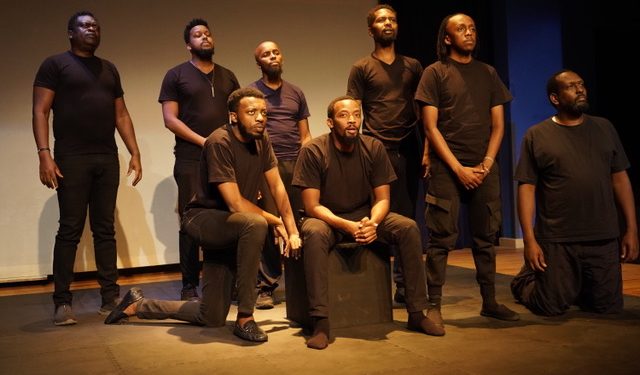Every knee stretched, and every voice embellished joyful noises when the stage lights turned off to mark the end of the two-act play, Voices of The Bible, Kings & Leaders Edition, brought to you by Chemi Chemi Players.
The play is a collection of vignettes detailing the lives, achievements and even flaws of the great rulers of the Bible, documented in both the Old Testament and The New Testament. It is evident that the original writer of this piece, Gillette Elvgren, together with their collaborators, selected Biblical characters whose life stories and leadership experiences could be adapted and showcased in contemporary Africa.
Repetition is a key element in Voices of The Bible, and through it, a keen audience member notices the nuances that the play’s director, Julisa Rowe, conveys to the audience. For instance, we are introduced into the world of the play when the actors sing Kenya’s national anthem against the projector screen, and their bodies cast shadows to enhance the shadow-theatre effect. The play then unravels at a relatively slow pace, when Adam, the first man according to the creation narratology, comes on stage. Adam takes us on a journey his vulnerability as the first man – he talks about his loneliness, and how solitude begets the “not enough” monster in many people’s heads. The ending of the play is also marked by the singing of the national anthem in both Kiswahili and English, through an elaborate definition of each stanza.
Apart from Adam, other kings and leaders are introduced through several vignettes. The cast comes on stage and does an introductory brief story about the leader and then exits as the mentioned leader makes a grand or a humble entry based on whether the character was a great ruler such as Solomon, Pharaoh, and David, or simply God’s messenger such as Aaron, Moses, Joshua, Gideon, Eli, Jeremiah, Mathew, John, Paul; or simply an accomplice, like Uriah.
The key element that made the story palatable to the audience is the versatility of the actors in their embodiment of all these Biblical kings, leaders, prophets, disciples and apostles. It was awesome to watch Elsaphan Njora, Mugambi Nthiga, Willie Wamae, Kevin Maina, Psenjen Sam, Justin Mirichii, Samuel Murega, and Steve Katingima immerse themselves into multiple characters and still maintain the distinct voices of these Biblical kings and leaders.

The costume designer in this production made deliberate choices in designing the outfits for every character to depict their status and positions in the world of the story. For instance, King Solomon and King David are adorned in royal attires that designate their positions as influential leaders in the history of Israel. The costumes of Moses had a touch of contemporary fashion as he wore a kimono dress, an Arafat and Moses’s iconic walking stick, but it’s just not clear what the intentions of the director and the designer were, for this character, since there was a blend of tradition and cultures in his costume design.
Justin Mirichii adds a layer to the character of Moses by consistently presenting to us a stammering leader, as in the case with the Biblical Moses. Although most of the characters are easily identifiable through their costumes, it seems the designer put the least effort into the design of Pharaoh’s costume. There was an opportunity to do more with Pharaoh, going by history, however, the designer chose just a golden cobra crown and a glittery waist cloth for this royalty. The props were limited in this production, but the available ones were key as far as complimenting the character and story era was concerned. For instance, David, Solomon and Fluffy Head write their letters using ink and feathers, the materials used to write in ancient times.
The creative use of satire in telling the story is commendable, and it helps in contextualising the narrative. For instance, the character of Matthew played by Sam Psenjen is presented to us as a tax collector working at KRA (Kenya Revenue Authority).. Every Kenyan easily resonates with KRA official’s duty of collecting taxes, forgiving the wealthy tax evaders and stringently following up on the SMEs and wananchi to pay their taxes. The fact that Matthew speaks like an ordinary Kenyan with a typical accent brings his character closer home.
Lighting design in Voices of The Bible is important element especially in the scene transitions and introduction of every leader whenever it is their turn. It is beautiful to see the incorporation of shadow theatre into the live action on stage as both help in advancing the story. This helped the director achieve some complex scenes or give a different layer and perspective. For instance, in the scene where David (Mirichii) plots the slaying of Uriah on the battlefield after he sleeps with Bathsheba, Uriah’s wife.

Sound design was appropriate, with only minimal sounds that accompanied the acts only when it was required. The fact that the entire cast could ease the tense moments between the scenes through their acapella renditions of various gospel songs as well as their ability to sing the national anthem gave Voices of The Bible several sonic aesthetics.
The element which was, however, downplayed, was the set design as the director opted for minimalism. There was the use of projections to help create the story worlds, both ancient as per the Biblical times, and contemporary during the moments when the characters commentated on the social evils in our current society, like corruption, hatred, greed, and hardened unforgiving hearts. There was an opportunity to give the story an elaborate setting, but this might not have been achievable due to factors best known to the director and the producer. That notwithstanding, the designer used readily available furniture interchangeably to achieve different environments, such as the king’s palace, and the open battlefield.
All in all, Voices of The Bible shows have set the precedent as far as the adaptation of Biblical stories is concerned. And since the director, Julisa Rowe, has promised the audience that Chemi Chemi Players will continue playing to its audiences more often, let us hope that more stage plays are in the pipeline.
Enjoyed this article?
To receive the latest updates from Sinema Focus directly to your inbox, subscribe now.











